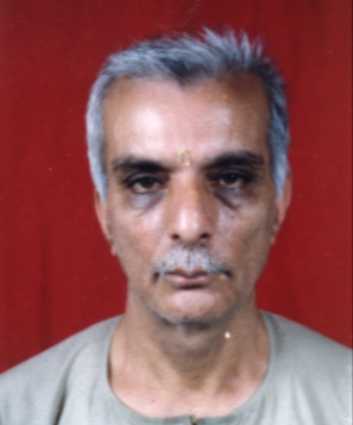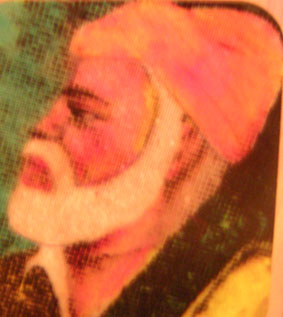Parmanand
and his 'Krishna Leela'
"Contentment
leads to perennial joy"
by Moti
Lal Khar
 The cultural life of Kashmir has had the impress of
great mystics. Often we witness a happy blending
of poetry and mysticism in it. Among these mystics
a prominent place goes to Parmanand, the great
saint-poet of southern Kashmir. The cultural life of Kashmir has had the impress of
great mystics. Often we witness a happy blending
of poetry and mysticism in it. Among these mystics
a prominent place goes to Parmanand, the great
saint-poet of southern Kashmir.
Pandit
Nand Ram, Parmanand being his penname, was born in
1791 A.D. in Seer Village near Mattan (Martand),
one of the famous holy places of India. Both his
father, Krishna Pandit, and his mother, Saraswati
Devi, were of religious bent of mind. Child Nand
Ram got his education in Persian, the court
language of Kashmir those days, in his own
village. He also learned Sanskrit from Sadhus who
used to visit and stay at Martand temple. Nand Ram
was a precocious child and his teachers and
schoolmates were greatly impressed by his sincere
devotion and inborn knowledge about spiritual
matters. He attained mastery over Persian and
wrote verses in that language under the pen-name
"Gareeb''.
Early
Life

Picture
Courtesy: Anjali Kaul, Austin
After
his schooling, Parmanand was married to Mal Ded, a
girl from his own village. She was an ill-tempered
lady, yet the tolerant nature of the saint took it
in its stride. His father was a Patwari in Mattan
village and after his death Nand Ram was offered
his father's post. A Patwari was looked down upon
by people in those days. Parmanand had no aptitude
for this post, but compelled by circumstances he
had to accept it in order to sustain himself and
his family.
Meditation
Parmanand
was greatly influenced by the scenic beauty of his
village and its surroundings. He would be found
sitting under a tree absorbed in deep meditation.
He would compose verses in Kashmiri there and
then. Unlike other Patwaris of his time he never
accepted bribes. On the contrary, he would at
times pay land revenue from his own pocket on
behalf of poor peasants. Being bold and frank,
Parmanand made sarcastic remarks in his verses
about the then despotic rule even at great risk.
He was put to severe hardship by his officers to
whom he would never bow or flatter. But by God's
grace he escaped dismissal or incarceration. Like
Guru Nanak Dev, Parmanand spent all he had to feed
Sadhus to the great distress and chagrin of his
wife. Parmanand's poor wife often rebuked him for
not caring for his family.
Seeing
this non-attachment to the things of the world
even at a young age, people living in the locality
came to realise that Parmanand was born to fulfill
a definite purpose and held him in high esteem.
After he left his job, devotees would arrange for
the maintenance of his family. Especially his
Muslim neighbour, Salah Ganai, the headman of the
village, stood by him through thick and thin,
knowing the worth and merit of Parmanand.
The
devotional songs of Parmanand are on the lips of
all Kashmiris. His poetic collections are
available in both Devanagri and Persian scripts.
Master Zinda Kaul, the famous poet of Kashmir, who
edited the poetic collections of Parmanand was
very much influenced by his poetry. Pandit Narayan
Kaul, and his beloved disciple-poet, Pandit Laxman
Bhat of village Nagam, also have edited some of
his collections. Parmanand was an eloquent and a
gifted poet endowed with a forceful style. His
devotional songs and hymns in praise of Lord
Krishna are to this day on the lips of every
Kashmiri. His Sudhama Charactar is regarded as one
of its best Kashmiri renderings. His spiritual
hymns and Leelas are recited in temples and on
marriage ceremonies or on festivals such as
Janamashtami or Shivratri. His style is direct and
effective.
Philosophy
Parmanand's
philosophy is best depicted in Karam Bhoomika
where he says that the highest good is only
attainable when the self is subdued and that
perennial joy is the reward obtained by the
mastery of one's own self. To overcome one's own
self, according to him, is to wage the toughest
war in the battlefield of life and to subdue one's
own self is the noblest of all victories.
Religion
for Paramanand was not mere ritual and formal
worship but something far more fundamental and a
matter deeply connected with the soul. In the
poem, Amarnath Yatra, he describes the different
paths and stages an aspirant has to pass in
spiritual Sadhna or practice. Most of his poems
are allegorical. His poem, Radha Suamber, is his
masterpiece and is regarded as one of the most
precious contributions to devotional literature.
To read Parmanand or listen to his Leelas is to
live through a religious experience which gives
Param- Anand: eternal bliss.
Fascinating
Parmanand's
poetry testifies to a fascinating kinship between
mystics all over India. His writings provide
convincing proof of the universality of the
concept that Truth is one, though sages call it by
different names. In his famous poem, Shiv-Lugan,
Parmanand propounds the unity of the One and the
many. The infinite and the finite are absolutely
identical, according to him. In another poem, The
Scenes of the Tree and its Shade, he says that God
is attained by merging the finite with the
infinite. He asserts that by getting freedom from
our wordly fetters we can attain salvation.
Parmanand
was loved and adored by Hindus and Muslims alike.
Salah Ganai gave him succor in his old age, when
Parmanand's kith and kin had died before him,
leaving him all alone. He had no son or daughter
of his own. At about 90, this great mystic poet
died in 1879 A.D. Pandit Laxman Bhat wrote his
death date in his elegy in which he lamented,
"The singing nightingale of the garden became
silent making the garden desolate".
Source:
Koshur
Samachar
| 